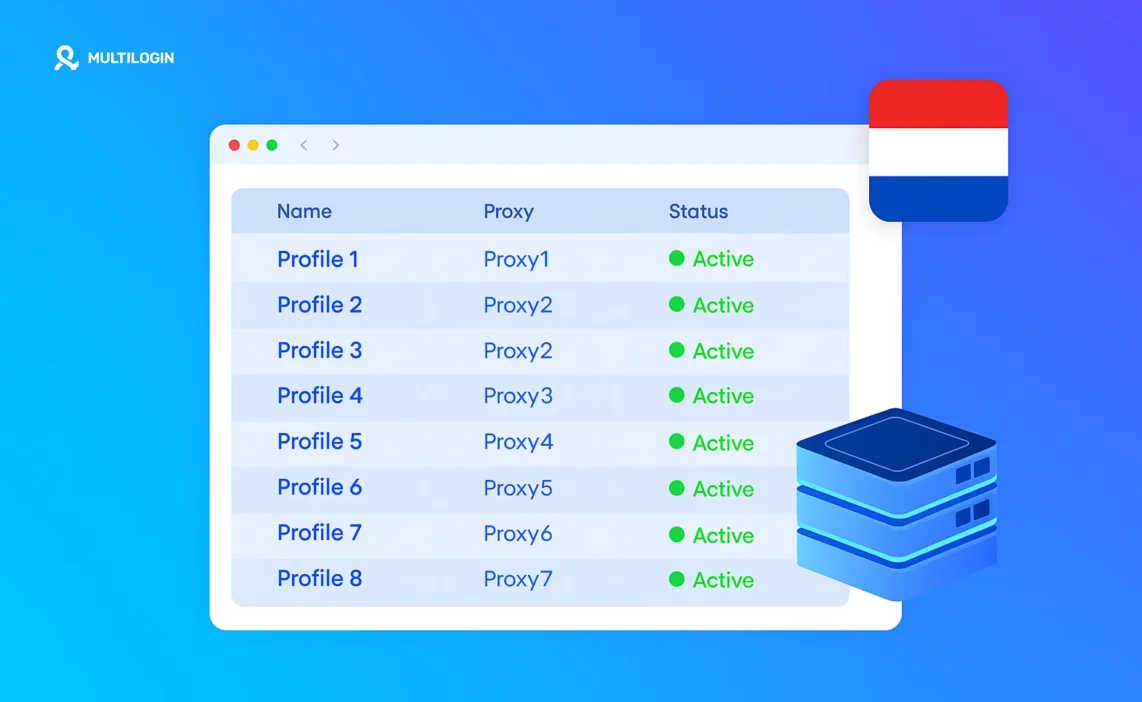The Netherlands has some of the strictest privacy laws in Europe—and Dutch internet users take their digital privacy seriously. With 51% of Dutch adults concerned about online privacy (according to Proton VPN’s 2024 survey), the demand for privacy-focused browsing solutions has never been higher.
But here’s the problem: regular browsers like Chrome, Firefox, and Safari leak your digital fingerprint to every website you visit. Even incognito mode doesn’t protect you. Websites can still track your device, link your accounts, and build detailed profiles about your online behavior.
That’s where antidetect browsers come in. These specialized tools create unique browser fingerprints for each profile, making it impossible for websites to link your activities together. Whether managing multiple e-commerce accounts, running social media campaigns, or simply protecting your privacy online, antidetect browsers give Dutch users the control they deserve.
This guide covers the nine best antidetect browsers for the Netherlands in 2025, with a special focus on beginner-friendly options that don’t require technical expertise.
What is an Antidetect Browser?
An antidetect browser is a specialized tool that masks your real browser fingerprint and creates unique digital identities for each browsing session. Unlike VPNs (which only change your IP address), antidetect browsers modify dozens of identifying parameters:
- Canvas fingerprinting
- WebGL fingerprinting
- Browser fonts and plugins
- Screen resolution and timezone spoofing
- Audio fingerprinting
- HTTP headers and user agents
This makes each browser profile appear as a completely different device to websites—essential for multi-account management, e-commerce operations, and privacy protection.
What is the Best Antidetect Browser?
For beginners in the Netherlands: Multilogin. It offers the perfect balance of powerful features and user-friendly interface, with built-in residential proxies and Dutch language support.
Let’s break down each option in detail.
9 Best Antidetect Browsers for Netherlands (2025)
1. Multilogin – Best Overall for Dutch Users
Why it’s #1: Multilogin is the gold standard for antidetect browsers, trusted by over 30,000 users worldwide—including thousands in the Netherlands. Founded in 2015, it’s the most established and reliable option on the market.
What makes it beginner-friendly:
- Clean, intuitive interface – No technical knowledge required
- Quick profile creation – Set up a new identity in under 60 seconds
- Built-in residential proxies – No need to source proxies separately
- 24/7 customer support – Real humans who actually help (rare in this industry)
- Comprehensive tutorials – Video guides in multiple languages
Key Features:
- Two browser engines: Mimic (Chromium-based) and Stealthfox (Firefox-based)
- Advanced browser fingerprinting protection
- Team collaboration features (share profiles with colleagues)
- Residential proxy integration
- API support for automation (Selenium, Puppeteer, Playwright)
- Mobile profile emulation (appear as iOS or Android devices)
Pricing:
- Trial: €1.99 for 3 days (5 profiles, 200 MB proxy traffic)
- Pro 10: €5.85/month when billed annually (10 profiles, 1 GB proxy traffic)
- Pro 50: 50 profiles, 3 GB proxy traffic
- Pro 100: 100 profiles, 5 GB proxy traffic
- Business: Starting from €103.35/month when billed annually (300+ profiles, unlimited team seats)
Perfect for:
- E-commerce sellers managing multiple Bol.com or Amazon accounts
- Digital marketers running Facebook/Instagram campaigns
- Agencies managing client accounts
- Privacy-conscious Dutch users
Why Dutch users love it:
- Complies with GDPR and Dutch privacy regulations
- Servers located in the Netherlands available
- Accepts iDEAL payment method
- Responsive support team familiar with Dutch market needs
Try Multilogin: Start your free trial and see why it’s the most trusted antidetect browser in the Netherlands.
2. Incogniton
Incogniton offers 10 completely free browser profiles—no credit card required. This makes it perfect for beginners who want to test antidetect technology before committing.
Key Features:
- Chromium-based browser
- Bulk profile creation
- Cookie management
- Basic automation support
- Team collaboration (paid plans)
Pricing:
- Starter: FREE (10 profiles for 2 months, then drops to 3 profiles)
- Starter Plus: $19.99/month (10 profiles)
- Entrepreneur: $29.99/month (50 profiles)
- Professional: $79.99/month (150 profiles, 3 team seats)
- Custom: $149.99/month (customizable profiles)
- 30% discount for 6-month or annual prepayment
Best for:
- Beginners testing antidetect browsers
- Small-scale operations (under 10 accounts)
- Budget-conscious users
Limitations:
- Free plan lacks advanced features
- No built-in proxies (must source separately)
- Smaller team and slower updates than competitors
Learn more: Incogniton vs. Multilogin comparison
3. Kameleo
Kameleo is the only antidetect browser offering truly unlimited profiles on all paid plans. For Dutch agencies managing hundreds of client accounts, this is a game-changer.
Key Features:
- Unlimited browser profiles
- Mobile app available (iOS and Android)
- Supports Chrome, Firefox, Edge, and Safari
- Local profile storage (no cloud dependency)
- Advanced fingerprint customization
Pricing:
- Free: €0/month (2 concurrent browsers, 300 minutes, 100 profile storage)
- Startup: €45/month (10 concurrent browsers, unlimited usage, unlimited profiles)
- Business: €225/month (100 concurrent browsers, mobile emulation, headless mode)
- Enterprise: €1125/month (1000 concurrent browsers)
- 25% discount for annual billing
Best for:
- Agencies with many clients
- Users needing mobile antidetect capabilities
- Those who prefer local storage over cloud
Considerations:
- Steeper learning curve than Multilogin
- Must manage your own proxy infrastructure
- Limited customer support compared to top-tier options
Learn more: Kameleo vs. Multilogin comparison
4. Octo Browser
Octo Browser offers the most granular control over fingerprint parameters. If you’re technically savvy and want to customize every detail, this is your browser.
Key Features:
- Chromium-based
- Extremely detailed fingerprint customization
- Team collaboration with role-based permissions
- Profile templates for quick setup
- Cookie Robot for automated cookie management
Pricing:
- Lite: €7/month when billed annually (3 profiles)
- Starter: €21/month when billed annually (30 profiles)
- Base: €56/month when billed annually (200 profiles, API access)
- Team: €119/month when billed annually (600 profiles, 6 team members) – Most Popular
- Advanced: €231/month when billed annually (100k profiles, unlimited team)
- Up to 30% discount for annual billing
Best for:
- Experienced users who need maximum control
- Large teams requiring advanced collaboration
- Users managing high-value accounts
Note: Not recommended for beginners—the interface can be overwhelming without technical knowledge.
Learn more: Octo Browser vs. Multilogin comparison
5. GeeLark
GeeLark is the first true antidetect solution for mobile apps. Instead of emulating mobile devices, it provides real Android cloud phones with unique fingerprints.
Key Features:
- Real Android devices (versions 10-13)
- Cloud-based (no local storage needed)
- Perfect for TikTok, Instagram, WhatsApp
- Automation templates included
- API integration available
Pricing:
- Free: $0/month (2 profiles, 30 minutes)
- Base: $19/month (50 profiles with 75 minutes/month, unlimited seats)
- Pro: $29/month (50 profiles with 75 minutes/month, includes AI and TikTok automation)
- Custom: Contact for 10,000+ profiles
- Cloud phone usage: $0.007/minute with $1/day cap
Best for:
- Social media managers focusing on mobile platforms
- TikTok marketers
- Instagram growth agencies
- Anyone needing genuine mobile fingerprints
Learn more: GeeLark Android Antidetect Solution Review
6. Dolphin Anty
Dolphin Anty offers competitive pricing with a generous free tier (10 profiles). It’s particularly popular among cryptocurrency airdrop farmers and affiliate marketers.
Key Features:
- Free plan available (10 profiles)
- Chromium-based
- Built-in automation tools
- Team collaboration
- Cookie management
Pricing:
- Free: 10 profiles
- Base: $89/month (100 profiles)
- Team: $159/month (300 profiles)
- Enterprise: $299/month (1000 profiles)
Best for:
- Crypto enthusiasts
- Affiliate marketers
- Small teams on a budget
Learn more: Dolphin Anty alternatives
7. VMLogin
VMLogin is particularly strong for users needing to access Chinese platforms or manage accounts on Alibaba, Taobao, and similar sites.
Key Features:
- Optimized for Chinese websites
- Supports Chinese payment methods
- Team collaboration
- Automation support
- Canvas fingerprinting protection
Pricing:
- Solo: $99/month (200 profiles)
- Team: $209/month (500 profiles)
- Scale: $499/month (unlimited profiles)
Best for:
- Dutch businesses sourcing from China
- E-commerce sellers on Chinese platforms
- Users needing Chinese market access
Learn more: VMLogin vs. Multilogin comparison
8. X-Browser
X-Browser is a free, open-source antidetect browser based on Chromium. While it lacks the polish of commercial options, it’s completely free and functional.
Key Features:
- Completely free
- Basic fingerprint spoofing
- Profile management
- No subscription required
- Open-source code
Best for:
- Developers who want to examine the code
- Users with zero budget
- Testing and learning purposes
Limitations:
- No support
- Limited features
- Manual proxy configuration required
- No team collaboration
Learn more: X-Browser vs. Multilogin comparison
9. Linken Sphere
Linken Sphere is designed for users with extreme security requirements. It’s popular in the fraud prevention and security research communities.
Key Features:
- Military-grade encryption
- Advanced anti-detection
- Secure profile storage
- No cloud dependency
- Regular security updates
Pricing:
- Starting at $100/month
Best for:
- Security researchers
- Fraud prevention specialists
- Users with extreme privacy needs
Note: Overkill for most users—only necessary if you have specific security requirements.
Learn more: Linken Sphere vs. Multilogin comparison
Is VPN Legal in the Netherlands?
Yes, VPNs are completely legal in the Netherlands. The country has strong privacy protections and no restrictions on VPN usage.
Dutch law allows VPNs for:
- Protecting online privacy
- Securing public Wi-Fi connections
- Accessing geo-restricted content
- Business security purposes
However, using VPNs for illegal activities (piracy, hacking, fraud) remains illegal, regardless of the VPN.
VPN vs. Antidetect Browser:
- VPNs change your IP address but don’t protect against browser fingerprinting
- Antidetect browsers change your entire digital fingerprint, including dozens of parameters beyond IP
- Best approach: Use both together for maximum privacy and account security
Learn more: Best VPN Proxy Alternatives
Why Multilogin is the Best Choice for Dutch Users
After testing dozens of antidetect browsers, Multilogin consistently delivers the best experience for Netherlands-based users:
1. Proven Reliability
- 10+ years in business (since 2015)
- 30,000+ active users worldwide
- Zero major security breaches
- Regular updates and improvements
2. Beginner-Friendly
- Intuitive interface requiring no technical knowledge
- One-click profile creation
- Built-in proxies (no separate sourcing needed)
- Comprehensive video tutorials
3. Advanced Features
- Two browser engines (Chromium and Firefox)
- Mobile device emulation
- API integration for automation
- Team collaboration tools
- Cloud profile storage
4. Dutch Market Advantages
- GDPR compliant
- Netherlands server locations available
- iDEAL payment support
- Responsive support team
- Understanding of Dutch e-commerce platforms (Bol.com, Marktplaats)
5. Best Fingerprinting Technology
- Passes all major fingerprinting tests
- Consistent, non-unique fingerprints
- Regular updates to stay ahead of bot detection
- Trusted by major e-commerce sellers
6. Excellent Support
- 24/7 live chat support
- Real humans (not bots)
- Fast response times
- Helpful community forum
👉 Don’t risk bans: Try Multilogin and keep your accounts undetected.
Frequently Asked Questions About Best Antidetect Browsers for Netherlands
Yes, antidetect browsers are completely legal in the Netherlands. They’re tools for privacy protection and legitimate multi-account management. However, using them for illegal activities (fraud, hacking) remains illegal.
Not necessarily. Antidetect browsers provide more comprehensive protection than VPNs by changing your entire browser fingerprint. However, combining both offers maximum privacy. Learn more about how to use proxies with antidetect browsers.
Quality antidetect browsers like Multilogin create fingerprints that appear completely natural to websites. Poor antidetect browsers can be detected through fingerprint inconsistencies. Learn about bot detection software and how Multilogin bypasses it.
Incognito mode only prevents local history storage. Websites can still fingerprint your device and track you. Antidetect browsers change your actual fingerprint, making tracking impossible.
Not recommended. Free proxies are often blacklisted, slow, and insecure. Use residential proxies for best results. Multilogin includes built-in proxies.
The Bottom Line
For Dutch users in 2025, Multilogin is the clear winner for antidetect browsing. It combines powerful features with beginner-friendly design, making it accessible to everyone from privacy-conscious individuals to large e-commerce agencies.
The Netherlands’ strong privacy culture and advanced digital infrastructure make it an ideal market for antidetect technology. Whether protecting personal privacy, managing multiple business accounts, or running marketing campaigns, antidetect browsers provide the control and security Dutch users demand.
Ready to take control of your digital privacy? Start your Multilogin trial today and experience the difference a professional antidetect browser makes. With built-in proxies, intuitive interface, and world-class support, it’s the easiest way to protect your online identity.



